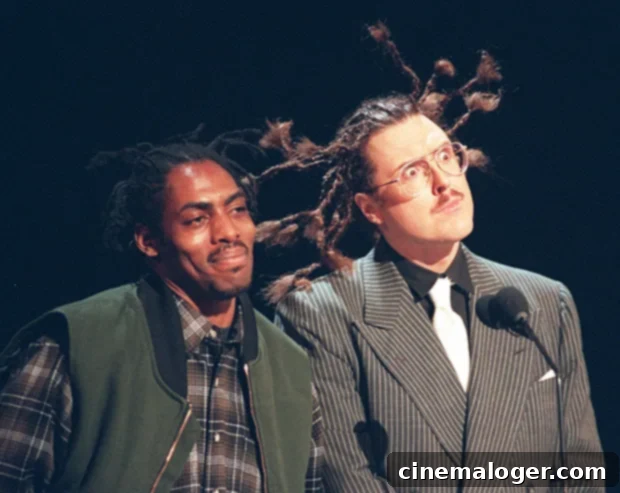Weird Al Yankovic’s Heartfelt Tribute to Coolio: Revisiting the ‘Gangsta’s Paradise’ Parody Feud and Lasting Reconciliation
The global music community paused in late September 2022 to mourn the tragic passing of legendary rapper Coolio, who died at the age of 59. Among the many heartfelt tributes from fans and fellow artists, one message in particular resonated deeply, stirring memories of a famous, though ultimately resolved, musical disagreement. Weird Al Yankovic, the undisputed master of musical parody, took to his Twitter account late on Wednesday, September 28, to share a touching, simple photo of himself embracing Coolio, accompanied by the caption “RIP Coolio.” This gesture, seemingly straightforward, carried significant weight for those familiar with the complicated history between the two artists – a history rooted in one of hip-hop’s most iconic tracks and its equally iconic parody.
The public display of respect and fondness from Weird Al served as a poignant reminder that even the most publicized disagreements in the entertainment industry can eventually yield to mutual understanding and admiration. The photo itself, showing two artists from vastly different musical genres connected by a shared moment of warmth, symbolized a profound reconciliation that had taken years to forge but ultimately proved stronger than any past animosity. It was a beautiful testament to growth, forgiveness, and the enduring human connection that can transcend initial misunderstandings.

The Cultural Phenomenon of “Gangsta’s Paradise”: A Defining 90s Anthem
To fully grasp the depth of their initial conflict, one must first appreciate the monumental impact of Coolio’s 1995 hit, “Gangsta’s Paradise.” This track wasn’t merely a song; it was a bona fide cultural phenomenon that transcended genre boundaries and captivated audiences worldwide. Built around a distinctive, melancholic sample from Stevie Wonder’s 1976 song “Pastime Paradise,” with an iconic vocal hook delivered by singer L.V., “Gangsta’s Paradise” offered a grim yet poetic reflection on life in the streets. Its raw honesty, coupled with a haunting melody and Coolio’s distinctive flow, propelled it to the top of music charts globally, becoming one of the best-selling singles of all time.
The song’s ubiquity was further cemented by its prominent inclusion on the soundtrack for the Michelle Pfeiffer film Dangerous Minds. This strategic placement introduced “Gangsta’s Paradise” to an even broader audience, far beyond traditional hip-hop listeners, solidifying its status as a quintessential crossover success. Coolio himself expressed genuine surprise at the song’s widespread appeal. In a 2017 interview with The Voice, as reported by BBCNews, he remarked, “I thought it was going to be a hood record. I never thought it would crossover the way that it did – to all ages, races, genres, countries and generations.” Indeed, its enduring popularity is evident even today, with the song having been streamed over a billion times on platforms like Spotify and YouTube, testament to its timeless message and unforgettable sound.
“Gangsta’s Paradise” wasn’t merely a commercial success; it was critically acclaimed, earning Coolio a Grammy Award for Best Rap Solo Performance in 1996. Its lyrical depth, combining sharp social commentary with a personal narrative of struggle and hope, resonated with millions, painting a vivid picture of the challenges faced in urban environments while also highlighting a universal quest for meaning and peace. This track solidified Coolio’s place as a significant voice in 90s hip-hop, an artist capable of crafting poignant narratives that struck a chord across diverse demographics and cemented his legacy as a true innovator.

“Amish Paradise”: The Parody That Ignited a Lingering Feud
Given the immense success, serious themes, and pervasive presence of “Gangsta’s Paradise,” it was perhaps inevitable that it would attract the attention of Weird Al Yankovic. Known for his ingenious ability to transform popular songs into hilarious, often absurd, parodies, Al saw comedic gold in Coolio’s hit. He released “Amish Paradise” in 1996, a brilliantly conceived reimagining of the original lyrics to depict the simple, technology-free life of the Amish community. The parody, with its witty lines, clever wordplay, and humorous music video that meticulously mimicked Coolio’s original, quickly became a hit in its own right, showcasing Al’s unparalleled talent for musical satire and cultural observation.
However, “Amish Paradise” also sparked a public feud that would cast a shadow over the relationship between the two artists for several years. The core of the disagreement lay in the alleged lack of proper permission. Weird Al has always prided himself on adhering to a strict ethical code: he consistently seeks and obtains permission from the original artists before parodying their work. This practice has largely insulated him from legal disputes and earned him a reputation for respect within the music industry. In this particular instance, Al’s team claimed they had secured all necessary approvals from Coolio’s record label and, specifically, from Coolio’s manager. However, Coolio vehemently asserted that he was never personally made aware of the parody and certainly never gave his direct blessing. This discrepancy led to a significant rift, with Coolio publicly expressing his anger and feeling profoundly disrespected by Al’s rendition.
The Misunderstanding and its Unfortunate Aftermath
The situation quickly escalated into a classic case of miscommunication and differing expectations. From Weird Al’s perspective, he had followed his standard, industry-accepted protocol, which usually involved going through management and the record label. For Coolio, a fiercely independent artist whose breakout hit was such a deeply personal and culturally significant statement, the personal connection and direct approval were paramount. He felt his serious work had been trivialized, and perhaps, that his artistic integrity had been undermined without his consent. At the time, parodies, especially those that gained mainstream traction, could sometimes be perceived as mocking rather than celebratory. For an artist whose breakout hit was such a profound statement, the humorous transformation into “Amish Paradise” was initially difficult to accept, particularly without his direct consent. This misunderstanding fueled a narrative of resentment that lingered for a significant period, casting a shadow over what might otherwise have been viewed as a clever and respectful homage.
The public spat quickly became a talking point across media outlets, with fans and critics often taking sides, debating the ethics of parody, artistic ownership, and the responsibilities of artist management. Coolio’s initial reaction, while intense, was entirely understandable given his perception of the events. He felt that a piece of his art that resonated so deeply with him and millions around the world had been exploited for comedic purposes without his explicit, personal approval, leading to a feeling of betrayal and disrespect that took time and reflection to overcome.
Coolio’s Change of Heart: A Powerful Act of Reconciliation and Humility
Despite the initial friction and the years that followed, time, as it often does, brought perspective, maturity, and a profound shift in Coolio’s outlook. Long after the immediate heat of the feud had dissipated, Coolio began to reflect on the situation differently. His eventual public reconciliation with Weird Al became as notable as their initial disagreement, showcasing his remarkable capacity for introspection, growth, and humility. As shared by music writer Dan Ozzi, who tweeted about a past interview, Coolio eventually admitted he had been wrong, offering a rare glimpse into an artist’s personal evolution.
In a powerful and candid statement, Coolio expressed his regret over his initial reaction and acknowledged his fault. “I let that go so long ago,” Coolio said, per Dan’s tweet. “Let me say this: I apologized to Weird Al a long time ago and I was wrong. Y’all remember that, everybody out there who reads this s***.” This public admission was not just a simple retraction; it was a profound testament to his character, demonstrating a rare level of humility and self-awareness in an industry often characterized by ego and defensiveness. He didn’t just move on; he openly recognized his past error.
The Grammy winner went on to explain his reasoning, emphasizing the importance of owning one’s mistakes and growing from them. “Real people” should be able to admit when they are wrong, he asserted. “I was wrong, bro. Come on, who the f*** am I, bro?” Coolio continued, reflecting on his youthful arrogance and initial misjudgment. “He did parodies of Michael Jackson, he did parodies of all kinds of people and I took offense to it because I was being cocky and s*** and being stupid and I was wrong and I should’ve embraced that s*** and went with it.” This statement revealed a deeply personal evolution, as Coolio acknowledged that his pride had clouded his judgment and prevented him from seeing the parody for what it truly was: a form of flattery, a recognition of a song’s immense cultural impact, rather than an insult.
Reflecting on the Humor and the Critical Role of Management
Coolio’s newfound appreciation for “Amish Paradise” was equally telling and indicative of his growth. “I listened to it a couple years after that and it’s actually funny as s***,” he added, demonstrating a complete shift in his perception. This realization transformed his view of the parody from a source of grievance to a source of genuine humor, allowing him to fully embrace its cleverness and creativity. He even pointed fingers, not at Al, but squarely at his own team for failing to intervene and guide him through the initial misunderstanding and his subsequent public outburst.
“It’s one of those things where I made a wrong call and nobody stopped me. That’s one thing I’m still upset about—my management at the time. Somebody should’ve stopped me from making that statement because it was dumb. And I think it hurt me a little bit. It made me seem stupid.” This candid critique of his past management underscores the immense pressures artists face and the critical role their support systems play in navigating public relations, artistic decisions, and potential controversies. Coolio clearly felt that better guidance could have prevented the prolonged feud and spared him the public perception he later regretted, highlighting the complex dynamics between artists and their representatives.
The Enduring Legacy of Friendship, Forgiveness, and Artistic Respect
The eventual reconciliation between Weird Al Yankovic and Coolio stands as a powerful and inspiring example of forgiveness, maturity, and mutual respect within the often-turbulent music industry. It illustrates that artistic disagreements, even those fueled by significant misunderstandings and public outcry, are not always permanent. Coolio’s willingness to openly admit his mistake and Weird Al’s consistent grace and professionalism in dealing with the situation paved the way for a genuine friendship, visible in the heartwarming photo shared after Coolio’s death.
Coolio’s legacy, beyond his groundbreaking music, now includes this profound act of humility and reconciliation. He became an advocate for admitting when one is wrong, setting an example that resonates far beyond the entertainment world and speaks to universal human values. Similarly, Weird Al Yankovic continues to be celebrated not just for his unparalleled comedic genius and musicality but also for his professionalism, ethical approach to parody, and his respectful demeanor, a combination of factors that ultimately allowed for the healing of this particular rift.
The shared embrace in Weird Al’s tribute photo isn’t just a nostalgic glance at a past friendship; it’s a powerful testament to the enduring power of music to connect people, even when initial encounters are fraught with tension. It reminds us that artists, despite their larger-than-life public personas, are fundamentally human beings capable of growth, reflection, and ultimately, profound connection. Coolio’s passing was a significant loss for the music world, but his story, including his journey with Weird Al, leaves behind a legacy rich with powerful lessons about art, integrity, humility, and the ultimate beauty of making amends.
